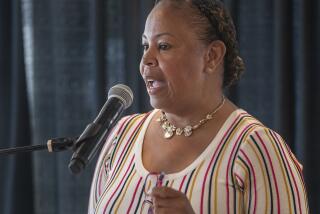Endorsement: Progressive icons Sheila Kuehl and Hilda Solis deserve another term as L.A. County supervisors
Los Angeles County Supervisors Sheila Kuehl and Hilda Solis are progressive icons who at the time of their election four years ago were hailed on the left as harbingers of a new era and feared by moderates as likely free-spenders who would give away the store to public employee unions. The Times supported both of them in 2014, albeit with some hand-wringing over fiscal responsibility.
Today, though, the county appears fiscally sound (although it has yet to be tested by an economic downturn), and Kuehl, Solis and their three colleagues on the Board of Supervisors have set an ambitious agenda for addressing the most vexing challenges of residents most in need, especially the homeless. The board has persuaded voters to fund landmark efforts to expand services for tens of thousands of homeless, sick and addicted residents, and to bring parks and recreation to underserved neighborhoods. We breathe a sigh of relief and consider whether Kuehl and Solis each deserve another term. They do.
Let’s begin with Kuehl, who represents a district that includes the sparsely populated Santa Monica Mountains and a host of mostly wealthy cities — Beverly Hills, Malibu, Santa Monica, a huge chunk of the city of L.A. Those cities see to their own municipal services, leaving Kuehl free to focus on systemic county issues.
Kuehl was the originator or a key mover in a number of long-needed improvements — to the representation of juveniles accused of crimes, to the treatment of young offenders in probation camps and to the functioning of the civil service appeals system. As reform of an unjust bail system has slogged through the state Legislature, Kuehl (along with Solis) launched an overhaul of the county bail system. Yes, these programs are works in progress, with outcomes still uncertain. The point is that Kuehl got them started.
Kuehl was the primary mover behind the county’s Community Choice Energy program to provide an alternative to Southern California Edison — allowing consumers to sign up for environmentally sustainable energy options, while at the same time appealing to ratepayers’ pocketbook issues by giving them lower-priced options.
There are times when Kuehl has stood alone. She was the sole “no” vote on a motion to revamp mental health laws to allow officials to more easily treat mentally ill people against their will. The county’s bill is moving through Sacramento, but the questions Kuehl raised are sound and must be addressed.
From Solis, as well as from Kuehl, we’re looking forward to seeing the follow-through on probation, the jails, foster care and other county services.
Kuehl was skeptical of — but ultimately supported — a plan to replace the decrepit Men’s Central Jail. Activists argue that the (at least) $2 billion it would cost to build new facilities ought to be spent instead on mental healthcare and other services.
Opposition to the jail project has been a primary plank in the campaign of one of Kuehl’s opponents, Eric Preven, who ran four years ago. It is a worthy and complex topic of discussion, but Preven has not made the case that Kuehl has failed in her first term or that he would perform better.
Preven is also a critic of county secrecy, and he makes a valid point. Under Kuehl and her colleagues, obtaining documents and other information that ought to be public is at least as difficult as it has ever been. Kuehl, who currently chairs the Board of Supervisors, should work harder to make the county more transparent. We are also expecting action on those works in progress — bail and juvenile justice reform, but also getting services to the homeless, the mentally ill, the addicted and other too-often-marginalized members of society.
Also challenging Kuehl is Daniel Glaser, who presents little in the way of argument as to why he would do better than either Kuehl or Preven.
Solis also deserves another term on the county Board of Supervisors. She glided onto the board in late 2014 with the benefit of an unusual six-month head start, having won the June primary race so overwhelmingly that she didn’t have to face a runoff election. That gave her the opportunity to spend months mastering the details of the massive county bureaucracy, assemble a first-rate staff and hammer out an agenda.
But she squandered her good fortune. When she took office alongside Kuehl that December, she still hadn’t assembled her permanent staff, and her tenure continued to be marked by turmoil for two years as aides came and went in rapid succession. Even now, Solis has the board’s least stable staff, and that may have had an impact on her productivity.
Still, Solis has stood out by refusing to be an automatic vote in favor of whatever item is being pushed on her by her progressive supporters and colleagues.
She was a thorn in the side of campaigners for a $15 county minimum wage when she delayed a vote and demanded changes for small businesses and nonprofits. She angered backers of a county legal assistance fund for residents facing deportation by insisting that it not be available to people accused of violent crimes. She nearly scuttled a county effort to fund homeless services by focusing instead on a parks tax.
The backroom wrangling was messy, but the outcomes were good. The county got the wage, the legal fund and the programs for homelessness and parks, arguably in better shape than they would have been without Solis. She has on these occasions and several others demonstrated a laudable measure of political courage, if perhaps also an exasperating style of legislating.
Her task is made more difficult by an awkwardly drawn district that takes in northeast Los Angeles and the county’s southeast cities, and then cuts through the middle of the San Gabriel Valley and hangs on, by a thread, to Pomona and Claremont. Solis is a beloved figure in much of her district, in part because of her pioneering role as a Latina pol, but also because she is said to excel at constituent services.
No one is running against Solis and that’s lamentable, not because voters ought to oust her — she shows signs of coming into her own as a supervisor — but because the lack of competition means less discussion of the county’s challenges.
From Solis, as well as from Kuehl, we’re looking forward to seeing the follow-through on probation, the jails, foster care and other county services. And, when the economic downturn comes, as it inevitably will at some point, an ability to slow down spending without sacrificing the progress the county has made over the last four years.
Follow the Opinion section on Twitter @latimesopinion and Facebook
More to Read
A cure for the common opinion
Get thought-provoking perspectives with our weekly newsletter.
You may occasionally receive promotional content from the Los Angeles Times.










